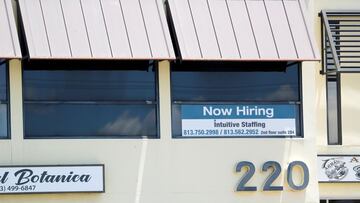Why are businesses struggling to hire even though unemployment is high?
On paper, the poor August jobs report does not make sense considering the millions of jobs available, but the answers point to varied reasons.

Despite a forecast of 750,000 new jobs, the US economy could barely muster just over a third of that, 235,000. It's the lowest total since January, and could increase fears of a general economic slowdown as the country heads towards winter. It would be wrong to suggest that this is because of a lack of jobs. On the contrary, the US has its highest number of available jobs in history, in figures reported on Wednesday. In July, it had more than 10.7 million available jobs.
These two figures should not be in this position, so many jobs shouldn't be available with so few taking them up. It begs questions, and should come as no surprise that the pandemic plays such a big role in this disparity.
Related news:
People's concerns returning the workplace
While much of the American economy has reopened this summer, the looming specter of covid-19 continues to haunt the economy. States that had removed all limits, like California, had to backtrack mere months later once infections began to soar. In polling, covid-19 continues to rank highly on reasons why people are not returning to the workplace.
The Biden administration has also acknowledged covid-19 as a major reason for the slowdown in jobs.
“There’s no question, the Delta variant is why today’s job report isn’t stronger,” he said. “We need to make more progress in fighting the Delta variant.”
“This is a continuing pandemic of the unvaccinated,” the President added. “Too many have not gotten vaccinated, and it’s creating a lot of unease in our economy and around our kitchen tables.”
The vaccine rollout has slowed to an absolute crawl in the US, forcing governments and business to impose vaccine mandates in order to force people to get the jab. With well over 45% of the whole US population still not fully vaccinated, there remains a real risk of serious transmission in the winter. A surge in cases and hospitalizations will inevitably lead to business closures, as was seen in Spring 2020 and last winter.
Desires of workers have changed
Workers have been under more pressure compared to any other group during the pandemic. The realization of powers workers hold, and the importance of many jobs considered 'low skilled' has lead to a consensus that the status quo was not good enough. Despite the defeat in Congress of the $15 minimum wage plan, many businesses are being forced to up their wages to attract employment. Often wages like this are not attainable for small businesses and big companies are still announcing layoffs.
Nick Bunker, research director at the Indeed Hiring Lab, said another unique factor is that many unemployed workers aren’t actually looking for new jobs. That’s because over a third of them are on temporary layoff, “which means they’ve been told they have a job to return to when the business can recall them,” he said. Temporary layoffs do not mean a definite return to work, however, as it can be turned permanent.
This means the available workforce is shrinking. Another factor in this shrink is the return of schools. What would usually be a time to return to work for adults without the need for childcare is being scuppered by the pandemic. Parents, which in terms of children will likely mean women, are needing to stay at home with school closures with the risk of covid-19 infection.
Extra unemployment benefits have ended
The final day of the expanded unemployment benefits has passed. Nearly 10 million Americans are seeing their support vanish this week, extremely troublesome in a time of high covid-19 levels and the resumption of evictions. Despite the lack of evidence that the early ending of unemployment support being a major factor in job numbers, a hard fact is the stripping of benefits federally will force people back into the workplace.
With student debt repayments and the threat of eviction once again looming, many Americans will have to turn to any job to prevent repossession of property. Indeed, as many as 1/3 of Americans are thought to be behind on rent or mortgage payments. A big covid-19 surge before winter could reintroduce unemployment support, but for now workers face many threats which will force many into subpar or unsafe labor to pay the bills.






